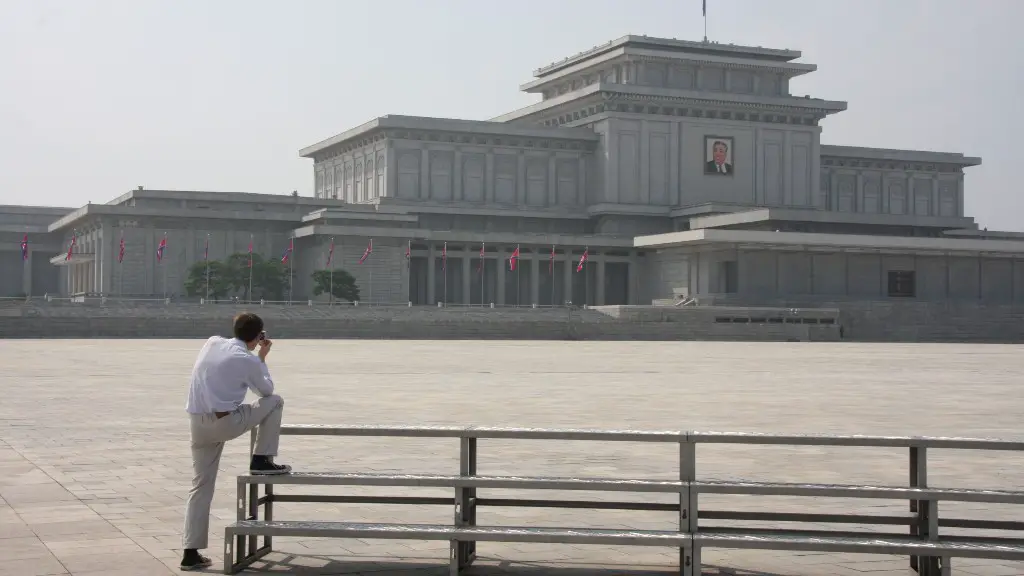Background
North Korea, officially known as the Democratic People’s Republic of Korea (DPRK), is a country located in East Asia. It is bordered by China and Russia to the north, and South Korea to the south. North Korea has made headlines over the decades due to its authoritarian government, nuclear weapons programs, and its tendency to isolate itself from the rest of the world. But despite its tumultuous history, North Korea has managed to survive and even flourish in some ways.
Controversial Government System
North Korea is one of the few countries in the world that still maintains a one-party system. The Korean Worker’s Party (KWP) is the only political party in the country, and it has total power and authority. The government is headed by the Supreme Leader, Kim Jong-un, who has been in power since 2011. Under Kim Jong-un, North Korea has continued to develop both large-scale infrastructure projects and weapons programs, as well as to focus on economic development.
Economy
North Korea’s economy has grown substantially over the past two decades. While it is still much poorer than its southern neighbour, South Korea, it has seen a number of reforms that have helped to boost economic growth. The government has also developed a five-year economic development plan to further stimulate economic activity and create jobs. They have also introduced market reforms that have allowed citizens to open small businesses and have access to consumer goods from abroad. Additionally, North Korea has received significant economic aid from China and other countries over the years.
Nuclear Weapon Programs
North Korea has had a long history of developing nuclear weapons. It has been estimated that the country currently has between ten and sixty nuclear weapons and the capability to build more. While the country has recently made some steps towards denuclearization and has agreed to halt tests in exchange for international aid, the country still has the capability to produce nuclear weapons. North Korea has been able to maintain a viable nuclear weapons program despite international condemnation and limitations due to their ability to continue to develop nuclear technology on their own.
International Relations
North Korea’s relations with the international community have been strained for decades. The country is seen as a pariah state and has been the subject of numerous international sanctions due to its nuclear weapons program and human rights abuses. Despite this, North Korea has managed to maintain diplomatic relations with a few countries, mainly China, Russia, and a few other nations. North Korea has also been able to cultivate relations with some countries outside the sphere of influence, such as South Africa, India, and the United States.
Strategic Positioning
North Korea has managed to stay afloat by playing the role of an international bogeyman. The country has skillfully used its nuclear program and its unpredictability to gain leverage in its foreign policy. By creating a sense of fear and uncertainty, North Korea has been able to gain aid and concessions from other countries. Additionally, North Korea has created a powerful military and has worked to enhance its position in the region by allying with its neighbours such as China and Russia.
Ideological Adherence
North Korea has also been able to stay afloat by adhering to the doctrine of Juche, which states that the people are the masters of their own destiny and that the nation must be completely self-reliant. This ideology has been embraced by the North Korean people, and has been used by the government as a way to justify their oppressive rule. This “us versus them” mentality has also been used by the state to instill a sense of nationalism and loyalty in its citizens.
Resistance to Change
North Korea has also been able to stay afloat through its refusal to embrace change and modernization. The country has been able to remain relatively isolated, and has kept foreign influences out. Additionally, the country has maintained a strict control over information and media, and has been able to keep out any outside ideas that could potentially threaten the status quo. This has allowed the government to maintain its hardline stance and avoid reform.
Impact of Sanctions
North Korea has managed to survive in spite of numerous international sanctions over the years. The sanctions have had a crippling effect on the economy, limiting trade and preventing foreign investment. However, the country has been able to find ways to skirt the sanctions, mainly through smuggling and illegal trade with other countries, such as China and Russia. This has enabled the government to continue to maintain its grip on power, despite the sanctions.
International Aid
North Korea has also managed to stay afloat through international aid. The country has been receiving economic and humanitarian aid from different countries, including China, Russia, and South Korea. This has enabled the country to stay afloat, despite its dire economic situation. This aid has not only helped to prop up the economy, but has also given the government the political capital to maintain its grip on power.


